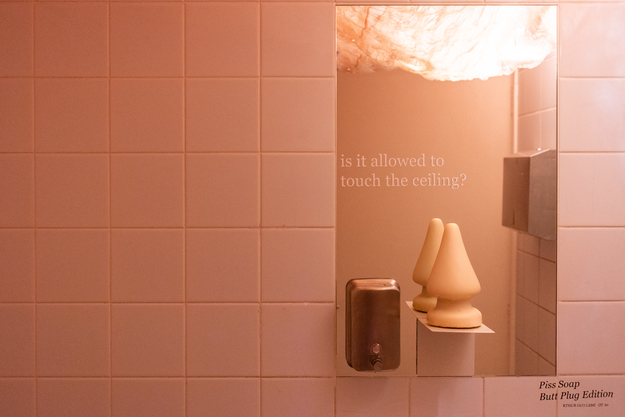Cities are potential engines of the transition towards a circular economy. The City of Amsterdam is one of the early adopters of the circular economy concept at city level. Closed loops, value generation, innovative business models, and modular designs – those are not only principles to guide the transition to circular cities, but also principles distributed designers have been working with for years. In our series Distributed Design for Circular Cities, we introduce you to some of the creative talents making an impact. In this episode, we interview Arthur Guilleminot about Piss Soap, for which he won the FUTURE THINKING award in the Distributed Design Awards 2021. Congrats, Arthur!
Can you give us a description of your project?
Piss Soap is part of my work as an artist on what I call challenging materials that are full of contradictions that invite the audience for a cognitive and somatic moment. It started when I was taking part in a residency in Greece. I studied the tradition in ancient Greece and Rome to use soap but also urine for things like laundry, teeth hygiene, and tanning leather. I wondered why the first practice of making soap is still very much alive, but urine’s use totally disappeared in our Western society. Piss Soap came from bringing these two traditions together: making a bar of soap – the base of our hygiene – from ‘gruesome’ ingredients. The project intends to reconnect a local audience to their wastes and their possible transformation.

Piss Soap © Arthur Guilleminot
In what way is your work contributing to circular cities?
Urine, used cooking oil, and wood ashes are the raw (waste) materials for Piss Soap. They are all rubbish from human activities but assembled together, they can produce a usable cleaning product. In a bigger way, I want to play with the social stigma of those gruesome materials. If we rethink our connection to waste, a whole new range of circular materials can become much more accepted. Materials like urine, frying oil, and wood ashes cost absolutely nothing, both in their ecological and material costs. The only costs are in the transformation. Piss soap is a project that tackles both our waste management and our Western vision upon disgust.
What drives you personally to work on this project?
As an artist, I believe in the ethics of going against normalcy and common sense. For me, an artist’s role is to propose new opportunities and mine tend to be deviant. I have always made environmentally connected work with a social impact as well. I want to propose future possibilities for a new kind of abundance. When I talk about abundance, I don’t mean profit-related or power. I mean the abundance we can show for each other and for the planet, the one that already surrounds us. It’s an abundance that we’re barely able to see as humans yet. It’s the kind I read about in Emergent Strategy: Shaping Change, Changing Worlds, a book written by Adrienne Maree Brown. She is a social justice facilitator that takes inspiration from science fiction. Emergent stategies are ways of looking for connections between the human and natural worlds as a means of building, and what we as a species can learn how to be in a right relationship with each other and the planet we are living on.
How might we design the transition from a linear to a circular system?
The idea of a transition is very interesting and very current. There’s a lot of change on a social and political level and this is the perfect breeding ground for us as artists to come together and propose a different approach. Circularity is a milestone of change. We have been conditioned to see in a linear vision. In order to change that, we need to start with strengthening communities, local and global. During the corona crisis, the problem of individualism really came to the surface. I now see so many different projects that are about coming together as a community and I think that’s what we should further build on.
What is your biggest hope for the future and what can we all start (or stop) doing as of tomorrow to contribute to that?
My hope is for everybody to be free to think outside of the box. Don’t be afraid to fuckup, embrace change and mobilise yourself to work within the change that’s coming. A very practical tip is to keep asking yourself before each decision: “Why do I?”. This way you can ‘deprogramme’ a part of our social conditioning and start aligning your actions with your ethics.
—
Distributed Design for Circular Cities is part of our programme for Distributed Design, the exchange and networking hub for the European maker movement. Want to know more about Distributed Design for Circular Cities? Check all the Creative Talent interviews and mark Thursday, October 14 from 18.00-19.00 in your calendars for our event and livecast in Pakhuis de Zwijger.

Distributed Design - Over 70 amazing submissions were shortlisted and 12 finalists selected – and now the 5 winners of this year’s Distributed Design Awards 2021 have been determined, recognizing the most innovative, supportive, and sustainable design projects across Europe. >>

Deem - Renaissance thinker, creator, and author Adrienne Maree Brown is best known for her work in social justice activism and facilitation alongside her ground-breaking books Emergent Strategy and Pleasure Activism. >>







